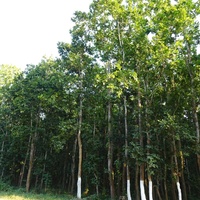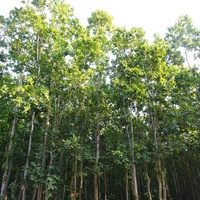Description
A native of India, this timber tree flowers after it starts to shed its leaves at the beginning of the dry season.
Semi-evergreen tree
Use
A major timber species, its heartwood is reported to be naturally resistant to very resistant to decay and attack by marine borers. An edible oil or fat expressed from the seed known as Sal Butter has wide application in food preparation and the food manufacturing industry. The leftover seedcake, after extracting the oil is sometimes used as an ingredient in both livestock and poultry feeds. However, despite a crude protein content of X%, the protein remains largely indigestible by livestock and poultry sometimes contributing to poor digestion overall.
The bark yields a natural dye in red and black used in dying textiles.
The kernel contains between 14 and 16% of an edible fat.
Sal Butter has a melting point of between 30 to 36 C and there is some interest in it as a Cocoa Butter Extender (CBE), used primary to extend or replace Cocoa Butter in the manufacture of chocolate-based confectionery products.
Climate
Grows naturally in sub-humid to humid subtropical and tropical lowland to mid-elevation tropical climates, generally in areas with average annual low temperatures of 15 to 25 °C, average annual high temperatures of 25 to 34 °C and annual rainfall of 900 to 3000 mm, accompanied by a dry season of 4 to 8 months.
How to grow
The seed are recalcitrant, losing their viability quickly and are best sown fresh, within two weeks of them being harvested.
Problem features
There does not appear to be any record of escape from cultivation or naturalisation anywhere.



